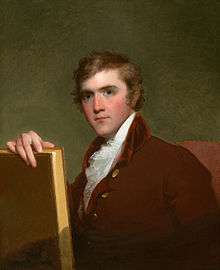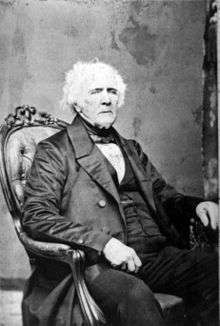Horace Binney
| Horace Binney | |
|---|---|
.jpg) | |
| Member of the U.S. House of Representatives from Pennsylvania's 2nd district | |
|
In office March 4, 1833 – March 3, 1835 | |
| Preceded by | Henry Horn |
| Succeeded by | Joseph R. Ingersoll, James Harper |
| Personal details | |
| Born |
January 4, 1780 Philadelphia, Pennsylvania |
| Died |
August 12, 1875 (aged 95) Philadelphia, Pennsylvania |
| Political party | Anti-Jacksonian |


Horace Binney (January 4, 1780 – August 12, 1875) was an American lawyer who served as an Anti-Jacksonian in the United States House of Representatives.
Biography
Binney was born in Philadelphia, Pennsylvania and graduated from Harvard College in 1797, where he founded the Hasty Pudding Club in 1795; he then studied law in the office of Jared Ingersoll (1749–1822), who had been a member of the Constitutional convention of 1787, and who from 1791 to 1800 and again from 1811 to 1816 was the attorney-general of Pennsylvania.[1]
Binney was admitted to the bar in Philadelphia in 1800 and practiced there with great success for half a century, and was recognized as one of the leaders of the bar in Pennsylvania and the United States.[2] He served in the Pennsylvania legislature between 1806–1807, and was a Whig member of the United States House of Representatives between 1833–1835 - here he defended the United States Bank, and opposing the policy of President Andrew Jackson.[3]
His nephews were Horace Binney Wallace, a legal critic and well-known author and Horace Binney Sargent, Civil war veteran.
His most famous cases were Lyle v. Richards (1823), and Vidal et al v. Philadelphia et al (1844). In the latter case, which involved the disposition of the fortune of Stephen Girard, he was unsuccessfully opposed by Daniel Webster. Binney's argument in this case greatly influenced the interpretation of the law of charities.[1]
Binney made many public addresses, the most noteworthy of which, entitled Life and Character of Chief Justice Marshall, was published in 1835. He also published:
- Leaders of the Old Bar of Philadelphia (1858), and an
- Inquiry into the Formation of Washingtons Farewell Address (1859).[1]
During the American Civil War he issued three pamphlets (1861, 1862 and 1865), discussing the right of habeas corpus under the American Constitution, and justifying President Lincoln in his suspension of the writ.[1] He was elected an Associate Fellow of the American Academy of Arts and Sciences in 1867.[4]
He is buried in the churchyard of Church of St. James the Less in Philadelphia.
See also
References
- 1 2 3 4 Chisholm, Hugh, ed. (1911). Binney, Horace. In Encyclopædia Britannica 3 (11th ed.). Cambridge University Press.
- ↑ Sarah Barringer Gordon, Professor of Law and History. Chiseling Legal Tradition., Penn Law
- ↑ Binney, Charles C. The Life of Horace Binney: With Selections from His Letters.Philadelphia: J.B. Lippincott Co, 1903.
- ↑ "Book of Members, 1780–2010: Chapter B" (PDF). American Academy of Arts and Sciences. Retrieved July 20, 2011.
- Attribution
-
 This article incorporates text from a publication now in the public domain: Chisholm, Hugh, ed. (1911). "Binney, Horace". Encyclopædia Britannica. 3 (11th ed.). Cambridge University Press.
This article incorporates text from a publication now in the public domain: Chisholm, Hugh, ed. (1911). "Binney, Horace". Encyclopædia Britannica. 3 (11th ed.). Cambridge University Press.
Further reading
- Binney, Charles C. The Life of Horace Binney: With Selections from His Letters. Philadelphia: J.B. Lippincott Co, 1903.
- Binney, Horace. An Eulogium upon the Hon. William Tilghman, Late Chief Justice of Pennsylvania (1827)
- Binney, Horace. The Privilege of the Writ of Habeas Corpus Under the Constitution (excerpt). History of the Federal Judiciary: Ex parte Merryman and Debates on Civil Liberties During the Civil War
External links
| Wikimedia Commons has media related to Horace Binney. |
- Horace Binney at Find a Grave
- United States Congress. "Horace Binney (id: B000475)". Biographical Directory of the United States Congress.
- Works by or about Horace Binney at Internet Archive
| United States House of Representatives | ||
|---|---|---|
| Preceded by Henry Horn |
Member of the U.S. House of Representatives from Pennsylvania's 2nd congressional district 1833–1835 alongside: James Harper |
Succeeded by Joseph R. Ingersoll and James Harper |